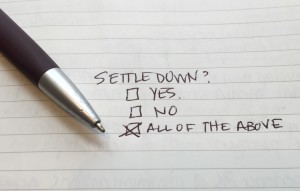The Paradox of Settling
“When are you going to settle down?” As a wander of more than 20 years, this is the question I’ve learned to field at least once a week. Friends, family, people I date, random acquaintances, and readers of the internet inquire about my ability to “settle” all of the time.
“Settle down?” It’s a simple question, and most often curious and well-meaning. Yet, on most occasions whenever these words enter my ears this question triggers my inner world into a mild state of panic.
Part of my brain screams “YES!”. Part of my brain screams “NO!”. It’s paralyzing.
What does settling down even mean for goodness sake? As a traveler who has built much of her existence on the premise of not being long-term geographically committed to one place, this question instantaneously triggers my self doubt to the very core.
For a long time I thought this inner struggle was a sign I must be broken, but eventually I realized that this is a trick question.
You see, there is no right answer to the “When will you settle down?” question, because, my friend, there’s a paradox in the very concept of settling.
In the strange universe of the English language, the word “settle” has multiple and very different—perhaps even contradictory–meanings.
Settle: verb
1) To stop, let something rest, to build a place to dwell
2) To accept or agree to something less than the best, less than satisfactory, or below what you want or deserve
When I hear, “When will you settle down,” my panicked brain translates these mystery words into a variety of other things like:
“Why can’t you to commit to anything?” or “When are you going to stop chasing your dreams and start doing stuff like regular people?” or “Will you ever grow up?”
After 20 years of breaking out in a sweat trying to make sense of this question I’ve finally learned a couple important things:
1. The Question is Actually Not About ME
If you’re a traveler, most people actually don’t care, beyond a mild curiosity, where you go or how long you stay there. The asker is usually just wondering “Are you going to stick around for awhile?” This usually isn’t a question that comes from a place of judgment, rather people want to know where they fit into your life.
When you don’t see the people you love very often, “when will you settle” is often an indirect way of stating “I really hope you’re going to be around more.”
2. The Real Question is for All of Us
While wanderers commonly gets asked this question most often, the real question is a little different, and it applies to all of us:
Can you be settled without settling?
Maybe the question for you is, “Can you be in a fixed location without taking less then you deserve”, or perhaps, “Can you be at a place of contentment and stillness without being in a fixed location?”
I’ve lived a very non-traditional life for most of the last 20+ years. Although it seems to some on the outside that I’ve been wandering aimlessly, I have been very “settled” into a global community and cause. I have been at home in my purpose-driven wandering. I have been settled without settling for years.
Three years ago I chose to move to a place where I could build a more sustainable geographically-based home and community. While I’ve unpacked and settled into Portland for now, I’m less about “settling down” and more about extraordinary living from a fixed address. It’s less settling and more striving for the new things that I want–making decisions for important things that are bigger than me—community, home, relationships, roots, etc.
A permanent address or our drive to be location interdependent doesn’t determine a settled or un-settled life.
Perhaps you’ve lived in the same home for 20 years, yet have given up on your dreams to be a painter or a writer or a supreme court justice (I hear there’s a job vacancy). If where you live makes you happy, great, but perhaps it’s time to choose to change something if life circumstances have driven you to settle for something less than what you were born to be.
We only have one chance in this life after all.
Stop settling. Start living your dreams.

